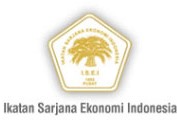Bitcoin and Blockchain to Indonesia’s Economic Resilience: A Business Intelligence Analysis
(1) University of Indonesia
(2) University of Indonesia
Abstract
Blockchain technology has been a phenomenal discovery since its use on Bitcoin, a crypto currency created by Satoshi Nakamoto. Featuring decentralization, it allows Bitcoin to escape the interference of third parties and governments. Departing from Keynesian Theory, this study used a mixed quantitative and qualitative approach. The econometric quantitative approach uses the Vector Error Correction Model (VECM) modeling to predict the impact of Bitcoin investment on Indonesia's transaction of capital. A qualitative approach is used to analyze the LOFT effects of Bitcoin on Indonesia's economic resilience. Unlike previous studies, this study attempts to provide an explanation from the standpoint of national resilience, especially in the field of economic resilience. VECM analysis found that Bitcoin had a significant positive effect on Indonesia's transaction of capital in both the short and long terms Even though the magnitude of the influence of bitcoin is relatively small, it needs to watch out for macro performance through capital transactions. Qualitative data indicate that there is a change of Bitcoin function in Indonesia, from a payment method, into an instrument of investment. The finding explains that Bitcoin has the potential to weaken the resilience of the Indonesian economy through a reduction in the balance of payments, while Blockchain can be the main foundation of the financial industry revolution in Indonesia.
Keywords
Full Text:
PDFReferences
Ammous, S. (2015). Economics beyond Financial Intermediation: Digital Currencies' Possibilities for Growth, Poverty Alleviation, and International Development. The Journal of Private Enterprise, 30(3), 19-50.
Anderson, B. (2006). Imagined Communities: Reflections on the Origin and Spread of Nationalism. New York: Verso.
Anisa, Amanda C. (2017). Factors Influencing Indonesia’s Balance of Payments. JOM Fekon, 4 (1).
Balance of Payments and International Investment Position Manual Sixth Edition (BPM6) Chapter 2. (2010, January). Accessed on June 8, 2018. http://www.imf.org/external/pubs/ft/bop/2007/pdf/chap2.pdf
Bank Indonesia prohibits bitcoin since 2018. (2017, December 5). Accessed on March 1, 2018. http://keuangan.kontan.co.id/news/bank-indonesia-larang-bitcoin-mulai-2018
Bitcoin is becoming more expensive, but is its investment becoming safer? (2017, August 15). Accessed on March 1, 2018. https://tirto.id/bitcoin-makin-mahal-apakah-investasinya-makin-aman-cuzq
Böhme, R., Christin, N., Edelman, B., & Moore, T. (2015). Bitcoin: Economics, Technology, and Governance. Journal of Economic Perspectives, 29(2), 213-238. Doi: http://doi.org/10.1257/jep.29.2.213
Bonneau, J., Miller, A., Clark, J., Narayanan, A., Kroll, J. A., & Felten, E. W. (2015). SoK: Research Perspectives and Challenges for Bitcoin and Cryptocurrencies. 2015 IEEE Symposium on Security and Privacy. Doi: http://doi.org/10.1109/sp.2015.14
Cavelty, M. D., & Mauer, V. (2009). Postmodern Intelligence: Strategic Warning in an Age of Reflexive Intelligence. Security Dialogue, 40(2), 123-144. Doi: http://doi.org/ 10.1177/0967010609103071
Chen, H., Chiang, R. H., & Storey, V. C. (2012). Business Intelligence and Analytics: From Big Data to Big Impact. MIS Quarterly, 36(4), 1-20.
Cooper, J. R. (2005). Curing Analytic Pathologies: Pathways to Improved Intelligence Analysis. Washington, DC, Center for the Study of Intelligence.
Cresswell, John W. (2003). Research Design: Qualitative, Quantitative and Mix Method Approach. USA: Sage Publication
Dibrova, A. (2016). Virtual Currency: New Step in Monetary Development. Procedia - Social and Behavioral Sciences, 229, 42-49.
Dodd, N. (2017). The Social Life of Bitcoin. Theory, Culture & Society. Doi: http://doi.org/10.1177/0263276417746464
Dwyer, G. P. (2015). The economics of Bitcoin and similar private digital currencies, Journal of Financial Stability, 17, 81-91.
Dyhrberg, A. H. (2016). Bitcoin, gold and the dollar – A GARCH volatility analysis. Finance Research Letters, 16, 85-92.
Elbahrawy, A., Alessandretti, L., Kandler, A., Pastor-Satorras, R., & Baronchelli, A. (2017). Evolutionary dynamics of the cryptocurrency market. Royal Society Open Science.
Enders, W. (2004). Applied Econometric Time Series. Technometrics Wiley, 46(2). Doi: http://doi.org/10.1198/tech.2004.s813
Fitri, W. (2014). Analysis of Factors Influencing the Current Account: A Case Study of Indonesia from 1990-2011. Economics Development Analysis Journal, 3(1), 55-69.
Giancaspro, M. (2017). Is a ‘smart contract’ really a smart idea? Insights from a legal perspective. Computer Law & Security Review, 33(6), 825-835. Doi: http://doi.org/10.1016/j.clsr.2017.05.007
Goldman, E. O. (2001). New Threats, New Identities and New Ways of War: The Sources of Change in National Security Doctrine. Journal of Strategic Studies, 24(2), 43-76. Doi: http://doi.org/10.1080/01402390108565554
Granger, C. W. J. (1969). Investigating Causal Relations by Econometric Models and Cross-spectral Methods. Econometrica. 37 (3): 424–438. doi: http://doi.org/10.2307/1912791
Gujarati, N. D., & Porter, C. D. (2013). Basics of Econometrics, 5th ed. Jakarta: Salemba Empat.
Hady, H. (2001). International Economy Book 2: International Financial Theories and Policies. Jakarta: Ghalia Indonesia
Howson, C., & JoseÌ, G. F. (2009). Business intelligence: Estrategias para una implementacioÌn exitosa. MeÌxico: McGraw Hill.
Hulnick, A. S. (2005). Indications and Warning for Homeland Security: Seeking a New Paradigm. International Journal of Intelligence and CounterIntelligence, 18(4), 593-608.
Huntington, S. P. (2012). The Clash of Civilizations and the Remaking of World Order. Jakarta: Qalam.
Hussain, S., & Malik, S. (2011). Inflation and Economic Growth: Evidence from Pakistan. International Journal of Economics and Finance, 3(5). Doi: http://doi.org/10.5539/ijef.v3n5p262
IMF. (1992). Balance of Payments Manual.
Keynes, J. M. (1936). General Theory of Employment, Interest, And Money. S.L.: Palgrave Macmillan.
Kharpal, A. (2017, April 12). Bitcoin value rises over $1 billion as Japan, Russia move to legitimize cryptocurrency. Accessed on December 18, 2017, from https://www.cnbc.com/2017/04/12/bitcoin-price-rises-japan-russia-regulation.html
Kira, A. R. (2013). The Factors Affecting Gross Domestic Product (GDP) in Developing Countries: The Case of Tanzania. European Journal of Business and Management, 5 (4), 148-158.
Kshetri, N. (2017). Blockchains roles in strengthening cybersecurity and protecting privacy. Telecommunications Policy, 41(10), 1027-1038. Doi: http://doi.org/10.1016/j.telpol.2017.09.003
Kubát, M. (2015). Virtual Currency Bitcoin in the Scope of Money Definition and Store of Value. Procedia Economics and Finance, 30, 409-416.
Lim, J. (2014). A Facilitative Model For Crypto-Currency Regulation In Singapore . Centre for Banking & Finance Law , Working Paper, Faculty of Law NUS. Accessed on February 28, 2018, https://papers.ssrn.com/sol3/papers.cfm?abstract_id=2580664.
Mandjee, T. (2016). Bitcoin, its Legal Classification and its Regulatory Framework. Journal of Business & Security Law, 15(2), 157-218.
Martinussen, J. D. (1997). Society, state and market: a guide to competing theories of development. London: Zed Books.
McElroy, W. (2018). The Satoshi Revolution. Bitcoin.com
Meiklejohn, S., Pomarole, M., Jordan, G., Levchenko, K., Mccoy, D., Voelker, G. M., & Savage, S. (2016). A fistful of Bitcoins: Characterizing Payments Among Men with No Names. Communications of the ACM, 59(4), 86-93.
Melani, A. (2017, December 4). Bitcoin transactions in Indonesia are speculation. Accessed on December 10, 2017, http://bisnis.liputan6.com/read/3184214/transaksi-bitcoin-di-ri-buat-spekulasi
Merry, U. (1995). Coping with Uncertainty: Insights from The New Sciences of Chaos, Self-Organization, And Complexity. Westport, CT: Praeger.
Murphy, E. V., Murphy, M. M., & Seitzinger, M. V. (2015). Bitcoin: Questions, Answers, and Analysis of Legal Issuesâ€. In CSR Report. Congressional Research Service.
Nakamoto, S. (2008, November). Re: Bitcoin P2P e-cash paper. Accessed on June 13, 2018, from https://satoshi.nakamotoinstitute.org/emails/cryptography/16/
Nakamoto, S. (2009, January). Bitcoin v0.1 released. Accessed on June 13, 2018, https://satoshi.nakamotoinstitute.org/emails/cryptography/16/#selection-33.0-33.58
Neuman, W. Lawrence. (2004). Social Research Methods: Quantitative and Qualitative Approaches.
Newman, R. P. (1975). Communication pathologies of intelligence systems. Speech Monographs, 42(4), 271-290. doi:10.1080/03637757509375903
Ølnes, S., Ubacht, J., & Janssen, M. (2017). Blockchain in government: Benefits and implications of distributed ledger technology for information sharing. Government Information Quarterly,34(3), 355-364. Doi: http://doi.org/10.1016/j.giq.2017.09.007
Otoritas Jasa Keuangan. (2018). Capital Market Statistics 2018. Accessed on June 28, 2018, https://www.ojk.go.id/id/kanal/pasar-modal/data-dan-statistik/statistik-pasar-modal/Documents/Statistik%20Januari%20Mgg%20ke-4%202018.pdf
Pazaitis, A., Filippi, P. D., & Kostakis, V. (2017). Blockchain and value systems in the sharing economy: The illustrative case of Backfeed. Technological Forecasting and Social Change, 125 , 105-115. Doi: http://doi.org/10.1016/j.techfore.2017.05.025
Phillips, F. (2007). On S-curves and tipping points. Technological Forecasting and Social Change,74(6), 715-730. Doi: http://doi.org/10.1016/j.techfore.2006.11.006
Pieters, G., & Vivanco, S. (2017). Financial regulations and price inconsistencies across Bitcoin markets. Information Economics and Policy,39, 1-14. Doi: http://doi.org/10.1016/j.infoecopol.2017.02.002
Plassaras, N. A. (2013) "Regulating Digital Currencies: Bringing Bitcoin within the Reach of the IMF," Chicago Journal of International Law: Vol. 14: No. 1, Article 12. Accessed on December 20, 2017, from http://chicagounbound.uchicago.edu/cjil/vol14/iss1/12/
Pridajumiga, R. (2009). Proses Peningkatan Pelayanan Perpustakaan MP UIN [Service Improvement Process of MP UIN Library]. Depok: Universitas Indonesia
Rathmell, A. (2002). Towards Postmodern Intelligence. Intelligence and National Security, 17(3), 87-104.
Raymaekers, W. (2014). Cryptocurrency Bitcoin: Disruption, Challenges and Opportunities. Journal of Payments Strategy & Systems, 9(1).
Reuter, T. W. (2015). Bitcoin: A new tool for structuring agreements and managing entities. Computer and Internet Lawyer, 32(1), 16-20
Richter, C., Kraus, S., & Bouncken, R. B. (2015). Virtual Currencies Like Bitcoin As A Paradigm Shift In The Field Of Transactions. International Business & Economics Research Journal (IBER), 14(4), 575. Doi: http://doi.org/10.19030/iber.v14i4.9350
Samuelson, P. A., & Nordhaus, W. D. (1998). Economics (16th ed.). New York: McGraw-Hill.
Savelyev, A. (2017). Contract law 2.0: ‘Smart’ contracts as the beginning of the end of classic contract law. Information & Communications Technology Law, 26(2), 116-134.
Savelyev, A. (2017). Copyright in the blockchain era: Promises and challenges. Computer Law & Security Review.
Seetharaman, A., Saravanan, A., Patwa, N., & Mehta, J. (2017). Impact of Bitcoin as a World Currency. Accounting and Finance Research,6(2), 230-246. doi: http://doi.org/10.5430/afr.v6n2p230
Sidaway, J. D. (2008). Subprime Crisis: American Crisis or Human Crisis? Environment and Planning D: Society and Space, 26(2), 195-198. doi: http://doi.org/10.1068/d2602ged
On virtual currencies, Sri Mulyani has her say (2017, December 7). Accessed on February 25, 2018. https://ekonomi.kompas.com/read/2017/12/07/135321326/soal-mata-uang-virtual-ini-kata-sri-mulyani
Sri Mulyani: It is up to the society to decide on Bitcoin as investment, but… (2018, January 23). Accessed on February 25, 2018. https://ekonomi.kompas.com/read/2018/01/23/131400926/sri-mulyani--bitcoin-sebagai-alat-investasi-keputusan-pada-masyarakat-tetapi
Surya, Yohanes & Situngkir, Hokky. (2008) Solution for Indonesia: Econophysical/Complexity Predictions. Tangerang: Kandel.
Suyuan, L., & Khurshid, A. (2015). The effect of interest rate on investment; Empirical evidence of Jiangsu Province, China. Journal of International Studies, 8(1), 81-90.
The People's Bank of China and Five Associated Ministries Notice: "Prevention of Risks Associated with Bitcoin". (2013, December 3). Accessed on December 18, 2017,https://www.btcchina.com/page/bocnotice2013
Tu, K. V., & Meredith, M. W. (2015). Rethinking Virtual Currency Regulation in The Bitcoin Age. Washington Law Review, 90(1), 271-347.
Urquhart, A. (2016). The inefficiency of Bitcoin. Economics Letters, 148, 80-82.
Usman, W. et al. (2003). National Resilience. Jakarta: Universitas Indonesia
Wardhana, I. M. W. (2018). Analysis of Virtual Currency Regulation in Indonesia. Jakarta: Universitas Indonesia
Weber, B. (2014). Bitcoin and the legitimacy crisis of money. Cambridge Journal of Economics, 40(1), 17-41.
Weber, Max. (1936). Social Action. US: Sage Publication.
Weber, Max. (1947). “Media of Exchange, Means of Payment, Money†in The Theory of Social and Economic Organization. New York: The Free Press
Weber, R. H., & Studer, E. (2016). Cybersecurity in the Internet of Things: Legal aspects. Computer Law & Security Review, 32(5), 715-728. Doi: http://doi.org/10.1016/j.clsr.2016.07.002.
Widarjono, A. (2009). Introduction to Econometrics and Its Application, Third Edition. Yogyakarta: Ekonisia.
Wright, A & De Filippi, P. (2015). Decentralized Blockchain Technology and the Rise of Lex Cryptographia. SSRN Electronic Journal. Doi: http://doi.org/10.2139/ssrn.2580664.
Yermack, D. (2017). Corporate Governance and Blockchains. Review of Finance. doi: http://doi.org/10.1093/rof/rfw074
Zur, O. (2016). Bartering in Psychotherapy & Counseling: Complexities, Case Studies and Guidelines.
Refbacks
- There are currently no refbacks.

This work is licensed under a Creative Commons Attribution 4.0 International License.







